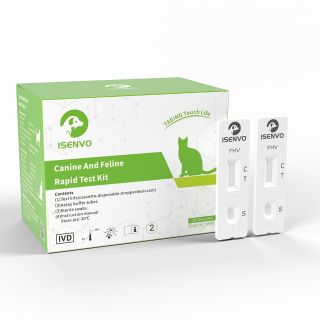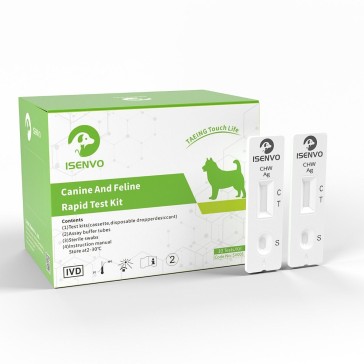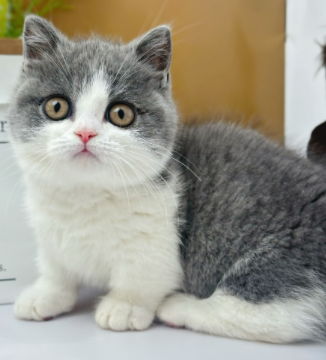Respiratory infections are a leading health concern in cats, particularly in shelters, catteries, and homes with multiple pets. Among the most common culprits is Feline Herpesvirus Type-1 (FHV-1)—a contagious virus that primarily affects the upper respiratory tract, eyes, and immune system.
With the right tools and timely intervention, cat owners can manage this condition more effectively and prevent widespread transmission—especially with the help of ISENVO’s FHV-1 Rapid Antigen Test Kit.
What Is Feline Herpesvirus (FHV-1)?
Feline Herpesvirus Type-1 (FHV-1) is a highly contagious virus responsible for feline viral rhinotracheitis (FVR), a core component of feline respiratory disease complex. Most cats are exposed to it at some point in their lives.
Once infected, a cat may become a lifelong carrier, shedding the virus during periods of stress or illness—even without obvious symptoms.
How FHV-1 Spreads
FHV-1 spreads through direct contact and contaminated objects. The virus can survive in the environment for several hours, making it easy to transmit in group settings.
Transmission routes include:
Eye, nose, or mouth secretions
Sneezing and grooming
Shared food bowls, bedding, litter boxes
Close cat-to-cat contact
Outbreaks are especially common in shelters, rescues, breeding facilities, and veterinary clinics.
Common Symptoms of FHV-1 Infection
FHV-1 causes symptoms that often resemble other feline infections, which is why accurate diagnosis is key. Common signs include:
Sneezing
Nasal discharge
Watery or red eyes (conjunctivitis)
Eye ulcers or squinting
Fever
Lethargy
Loss of appetite
While some cats recover within a few weeks, others—especially kittens and immunocompromised cats—may experience prolonged illness or repeated flare-ups.
Why Early Detection Is Critical
Recognizing and testing for FHV-1 at the first signs of illness can significantly impact a cat’s recovery and prevent the spread to others.
Early detection enables:
Prompt symptomatic treatment
Faster isolation and containment
Better long-term management of chronic carriers
Improved survival rates in kittens and high-risk cats
Whether you're a pet owner, vet technician, or animal shelter operator, rapid testing helps make informed decisions faster.
Introducing the ISENVO FHV-1 Rapid Test Kit
The ISENVO Feline Herpesvirus Antigen Rapid Test Kit is designed for easy, fast, and accurate detection of FHV-1 antigens in cats using simple swab samples.
Key Benefits:
Results in 5–10 minutes
Uses ocular, nasal, or anal secretions
No additional equipment required
Ideal for in-clinic or home use
Shelf-stable for 12+ months
Based on immunochromatographic technology
Comes as a complete kit: test cassette, buffer, swab sticks, dropper, and instructions
This makes it a valuable tool in both emergency triage and routine feline health monitoring.
Practical Use Cases
At home: Monitor respiratory symptoms in your cat or kittens
In shelters: Quickly screen new arrivals
In catteries: Ensure breeding cats are virus-free
In clinics: Speed up diagnosis and reduce unnecessary lab costs
Because results are available within minutes, this test supports on-the-spot decisions—crucial in high-volume or high-risk environments.
Preventing FHV-1 Outbreaks: Best Practices
Testing is one part of a multi-layered approach to preventing FHV-1 infections. Here’s what else you can do:
Vaccinate: Ensure all cats receive their core vaccines, which include protection against FHV-1.
Isolate sick cats: Separate symptomatic cats immediately to prevent further spread.
Disinfect frequently: Clean food bowls, litter boxes, and shared surfaces with pet-safe disinfectants.
Manage stress: Minimize changes and provide hiding spots to reduce stress, which can trigger viral shedding.
Monitor regularly: In high-risk environments, periodic testing is a proactive way to stay ahead of outbreaks.
Final Thoughts
Feline Herpesvirus is widespread and persistent—but it can be managed effectively with early detection and informed care.
With tools like the ISENVO FHV-1 Rapid Test Kit, cat owners, breeders, and veterinary professionals gain the ability to respond faster, reduce transmission, and improve outcomes.
Because when it comes to feline respiratory health, knowledge isn’t just power—it’s prevention.










Validate your login